Retail Industry Analysis: Current Trends and TK Maxx Business Review
VerifiedAdded on 2021/04/13
|8
|4245
|82
Report
AI Summary
This report provides a comprehensive analysis of the retail industry, beginning with an introduction to its core activities and significance in modern economies. It explores current trends, including the impact of the COVID-19 pandemic, the rise of e-commerce, and shifts in consumer behavior. The report delves into customer service strategies, emphasizing the importance of seamless experiences and leveraging technology to enhance customer engagement. A detailed business analysis of TK Maxx follows, examining its history, international expansion, and business model, with a focus on its SWOT analysis, highlighting strengths, weaknesses, opportunities, and threats. The analysis provides insights into TK Maxx's competitive advantages, challenges, and strategies for navigating the evolving retail landscape, providing a holistic view of the industry's dynamics.
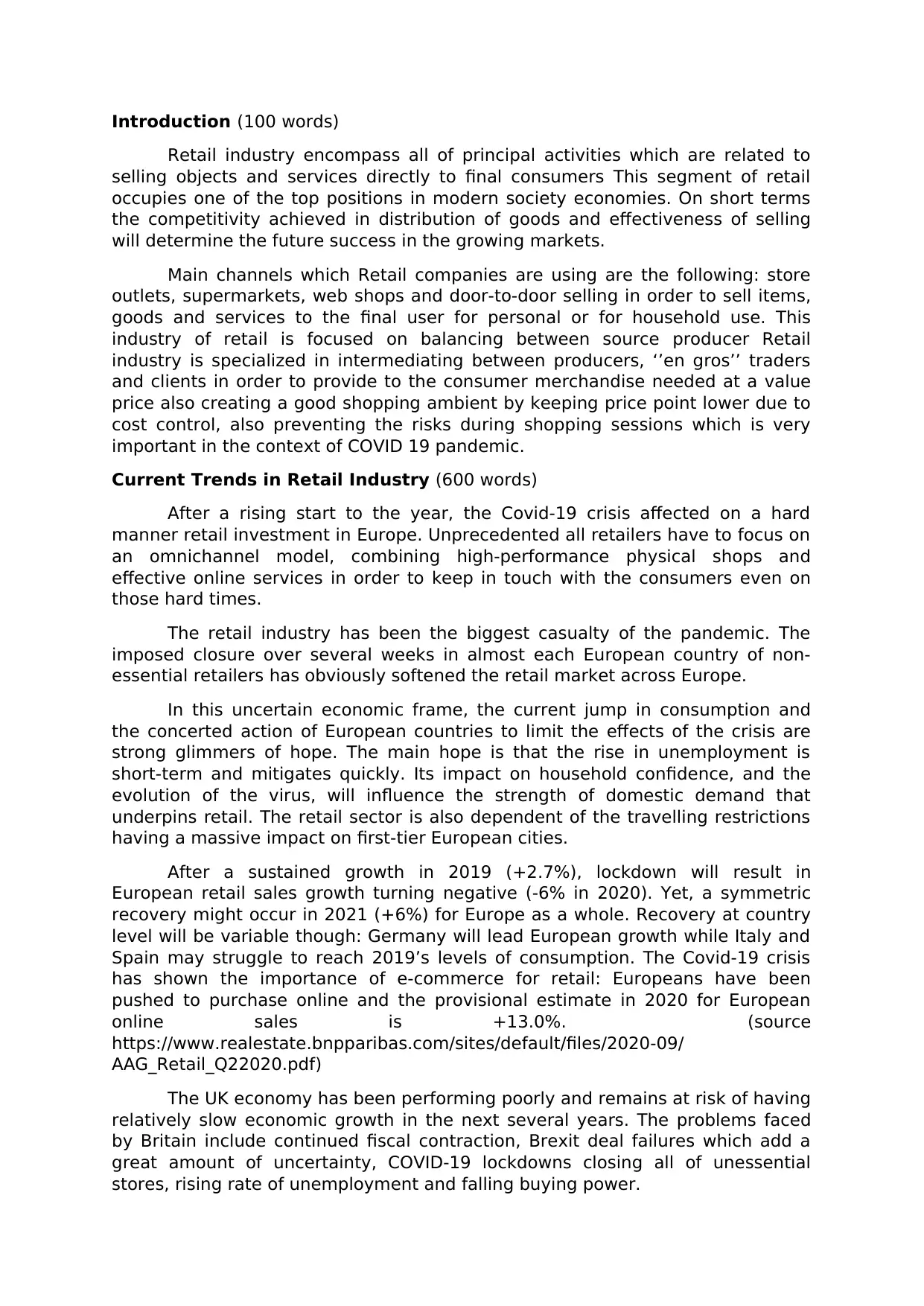
Introduction (100 words)
Retail industry encompass all of principal activities which are related to
selling objects and services directly to final consumers This segment of retail
occupies one of the top positions in modern society economies. On short terms
the competitivity achieved in distribution of goods and effectiveness of selling
will determine the future success in the growing markets.
Main channels which Retail companies are using are the following: store
outlets, supermarkets, web shops and door-to-door selling in order to sell items,
goods and services to the final user for personal or for household use. This
industry of retail is focused on balancing between source producer Retail
industry is specialized in intermediating between producers, ‘’en gros’’ traders
and clients in order to provide to the consumer merchandise needed at a value
price also creating a good shopping ambient by keeping price point lower due to
cost control, also preventing the risks during shopping sessions which is very
important in the context of COVID 19 pandemic.
Current Trends in Retail Industry (600 words)
After a rising start to the year, the Covid-19 crisis affected on a hard
manner retail investment in Europe. Unprecedented all retailers have to focus on
an omnichannel model, combining high-performance physical shops and
effective online services in order to keep in touch with the consumers even on
those hard times.
The retail industry has been the biggest casualty of the pandemic. The
imposed closure over several weeks in almost each European country of non-
essential retailers has obviously softened the retail market across Europe.
In this uncertain economic frame, the current jump in consumption and
the concerted action of European countries to limit the effects of the crisis are
strong glimmers of hope. The main hope is that the rise in unemployment is
short-term and mitigates quickly. Its impact on household confidence, and the
evolution of the virus, will influence the strength of domestic demand that
underpins retail. The retail sector is also dependent of the travelling restrictions
having a massive impact on first-tier European cities.
After a sustained growth in 2019 (+2.7%), lockdown will result in
European retail sales growth turning negative (-6% in 2020). Yet, a symmetric
recovery might occur in 2021 (+6%) for Europe as a whole. Recovery at country
level will be variable though: Germany will lead European growth while Italy and
Spain may struggle to reach 2019’s levels of consumption. The Covid-19 crisis
has shown the importance of e-commerce for retail: Europeans have been
pushed to purchase online and the provisional estimate in 2020 for European
online sales is +13.0%. (source
https://www.realestate.bnpparibas.com/sites/default/files/2020-09/
AAG_Retail_Q22020.pdf)
The UK economy has been performing poorly and remains at risk of having
relatively slow economic growth in the next several years. The problems faced
by Britain include continued fiscal contraction, Brexit deal failures which add a
great amount of uncertainty, COVID-19 lockdowns closing all of unessential
stores, rising rate of unemployment and falling buying power.
Retail industry encompass all of principal activities which are related to
selling objects and services directly to final consumers This segment of retail
occupies one of the top positions in modern society economies. On short terms
the competitivity achieved in distribution of goods and effectiveness of selling
will determine the future success in the growing markets.
Main channels which Retail companies are using are the following: store
outlets, supermarkets, web shops and door-to-door selling in order to sell items,
goods and services to the final user for personal or for household use. This
industry of retail is focused on balancing between source producer Retail
industry is specialized in intermediating between producers, ‘’en gros’’ traders
and clients in order to provide to the consumer merchandise needed at a value
price also creating a good shopping ambient by keeping price point lower due to
cost control, also preventing the risks during shopping sessions which is very
important in the context of COVID 19 pandemic.
Current Trends in Retail Industry (600 words)
After a rising start to the year, the Covid-19 crisis affected on a hard
manner retail investment in Europe. Unprecedented all retailers have to focus on
an omnichannel model, combining high-performance physical shops and
effective online services in order to keep in touch with the consumers even on
those hard times.
The retail industry has been the biggest casualty of the pandemic. The
imposed closure over several weeks in almost each European country of non-
essential retailers has obviously softened the retail market across Europe.
In this uncertain economic frame, the current jump in consumption and
the concerted action of European countries to limit the effects of the crisis are
strong glimmers of hope. The main hope is that the rise in unemployment is
short-term and mitigates quickly. Its impact on household confidence, and the
evolution of the virus, will influence the strength of domestic demand that
underpins retail. The retail sector is also dependent of the travelling restrictions
having a massive impact on first-tier European cities.
After a sustained growth in 2019 (+2.7%), lockdown will result in
European retail sales growth turning negative (-6% in 2020). Yet, a symmetric
recovery might occur in 2021 (+6%) for Europe as a whole. Recovery at country
level will be variable though: Germany will lead European growth while Italy and
Spain may struggle to reach 2019’s levels of consumption. The Covid-19 crisis
has shown the importance of e-commerce for retail: Europeans have been
pushed to purchase online and the provisional estimate in 2020 for European
online sales is +13.0%. (source
https://www.realestate.bnpparibas.com/sites/default/files/2020-09/
AAG_Retail_Q22020.pdf)
The UK economy has been performing poorly and remains at risk of having
relatively slow economic growth in the next several years. The problems faced
by Britain include continued fiscal contraction, Brexit deal failures which add a
great amount of uncertainty, COVID-19 lockdowns closing all of unessential
stores, rising rate of unemployment and falling buying power.
Paraphrase This Document
Need a fresh take? Get an instant paraphrase of this document with our AI Paraphraser
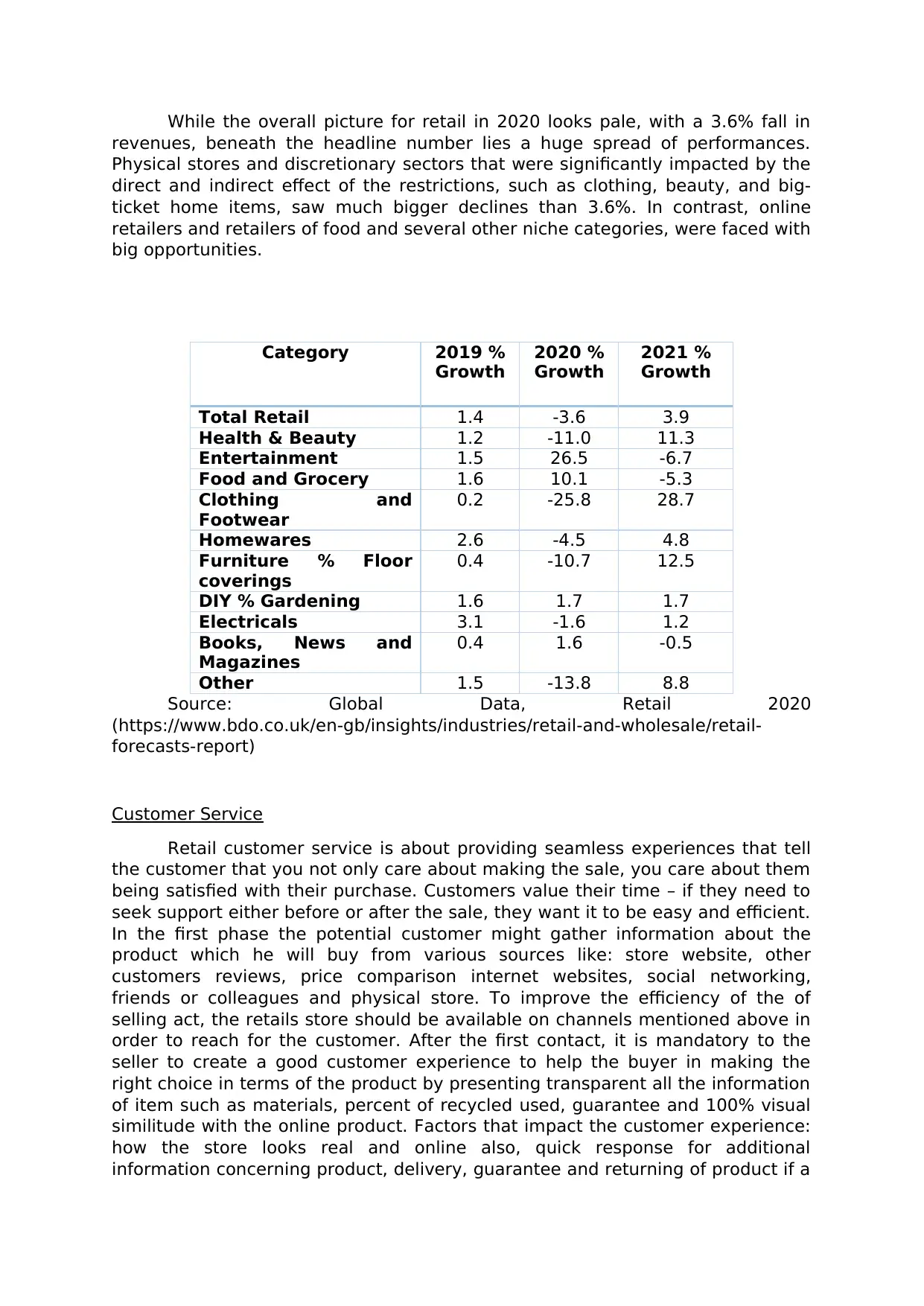
While the overall picture for retail in 2020 looks pale, with a 3.6% fall in
revenues, beneath the headline number lies a huge spread of performances.
Physical stores and discretionary sectors that were significantly impacted by the
direct and indirect effect of the restrictions, such as clothing, beauty, and big-
ticket home items, saw much bigger declines than 3.6%. In contrast, online
retailers and retailers of food and several other niche categories, were faced with
big opportunities.
Category 2019 %
Growth
2020 %
Growth
2021 %
Growth
Total Retail 1.4 -3.6 3.9
Health & Beauty 1.2 -11.0 11.3
Entertainment 1.5 26.5 -6.7
Food and Grocery 1.6 10.1 -5.3
Clothing and
Footwear
0.2 -25.8 28.7
Homewares 2.6 -4.5 4.8
Furniture % Floor
coverings
0.4 -10.7 12.5
DIY % Gardening 1.6 1.7 1.7
Electricals 3.1 -1.6 1.2
Books, News and
Magazines
0.4 1.6 -0.5
Other 1.5 -13.8 8.8
Source: Global Data, Retail 2020
(https://www.bdo.co.uk/en-gb/insights/industries/retail-and-wholesale/retail-
forecasts-report)
Customer Service
Retail customer service is about providing seamless experiences that tell
the customer that you not only care about making the sale, you care about them
being satisfied with their purchase. Customers value their time – if they need to
seek support either before or after the sale, they want it to be easy and efficient.
In the first phase the potential customer might gather information about the
product which he will buy from various sources like: store website, other
customers reviews, price comparison internet websites, social networking,
friends or colleagues and physical store. To improve the efficiency of the of
selling act, the retails store should be available on channels mentioned above in
order to reach for the customer. After the first contact, it is mandatory to the
seller to create a good customer experience to help the buyer in making the
right choice in terms of the product by presenting transparent all the information
of item such as materials, percent of recycled used, guarantee and 100% visual
similitude with the online product. Factors that impact the customer experience:
how the store looks real and online also, quick response for additional
information concerning product, delivery, guarantee and returning of product if a
revenues, beneath the headline number lies a huge spread of performances.
Physical stores and discretionary sectors that were significantly impacted by the
direct and indirect effect of the restrictions, such as clothing, beauty, and big-
ticket home items, saw much bigger declines than 3.6%. In contrast, online
retailers and retailers of food and several other niche categories, were faced with
big opportunities.
Category 2019 %
Growth
2020 %
Growth
2021 %
Growth
Total Retail 1.4 -3.6 3.9
Health & Beauty 1.2 -11.0 11.3
Entertainment 1.5 26.5 -6.7
Food and Grocery 1.6 10.1 -5.3
Clothing and
Footwear
0.2 -25.8 28.7
Homewares 2.6 -4.5 4.8
Furniture % Floor
coverings
0.4 -10.7 12.5
DIY % Gardening 1.6 1.7 1.7
Electricals 3.1 -1.6 1.2
Books, News and
Magazines
0.4 1.6 -0.5
Other 1.5 -13.8 8.8
Source: Global Data, Retail 2020
(https://www.bdo.co.uk/en-gb/insights/industries/retail-and-wholesale/retail-
forecasts-report)
Customer Service
Retail customer service is about providing seamless experiences that tell
the customer that you not only care about making the sale, you care about them
being satisfied with their purchase. Customers value their time – if they need to
seek support either before or after the sale, they want it to be easy and efficient.
In the first phase the potential customer might gather information about the
product which he will buy from various sources like: store website, other
customers reviews, price comparison internet websites, social networking,
friends or colleagues and physical store. To improve the efficiency of the of
selling act, the retails store should be available on channels mentioned above in
order to reach for the customer. After the first contact, it is mandatory to the
seller to create a good customer experience to help the buyer in making the
right choice in terms of the product by presenting transparent all the information
of item such as materials, percent of recycled used, guarantee and 100% visual
similitude with the online product. Factors that impact the customer experience:
how the store looks real and online also, quick response for additional
information concerning product, delivery, guarantee and returning of product if a
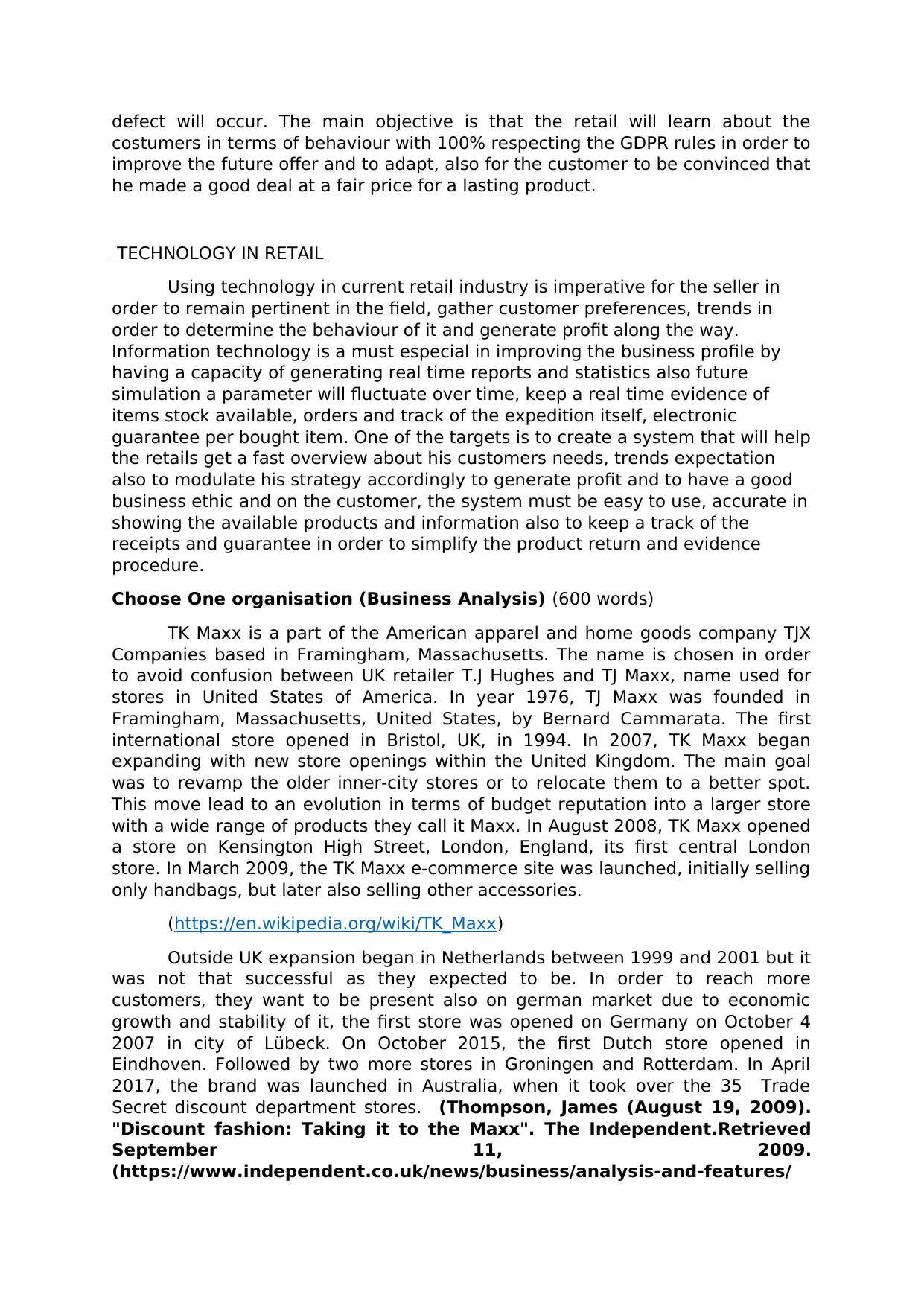
defect will occur. The main objective is that the retail will learn about the
costumers in terms of behaviour with 100% respecting the GDPR rules in order to
improve the future offer and to adapt, also for the customer to be convinced that
he made a good deal at a fair price for a lasting product.
TECHNOLOGY IN RETAIL
Using technology in current retail industry is imperative for the seller in
order to remain pertinent in the field, gather customer preferences, trends in
order to determine the behaviour of it and generate profit along the way.
Information technology is a must especial in improving the business profile by
having a capacity of generating real time reports and statistics also future
simulation a parameter will fluctuate over time, keep a real time evidence of
items stock available, orders and track of the expedition itself, electronic
guarantee per bought item. One of the targets is to create a system that will help
the retails get a fast overview about his customers needs, trends expectation
also to modulate his strategy accordingly to generate profit and to have a good
business ethic and on the customer, the system must be easy to use, accurate in
showing the available products and information also to keep a track of the
receipts and guarantee in order to simplify the product return and evidence
procedure.
Choose One organisation (Business Analysis) (600 words)
TK Maxx is a part of the American apparel and home goods company TJX
Companies based in Framingham, Massachusetts. The name is chosen in order
to avoid confusion between UK retailer T.J Hughes and TJ Maxx, name used for
stores in United States of America. In year 1976, TJ Maxx was founded in
Framingham, Massachusetts, United States, by Bernard Cammarata. The first
international store opened in Bristol, UK, in 1994. In 2007, TK Maxx began
expanding with new store openings within the United Kingdom. The main goal
was to revamp the older inner-city stores or to relocate them to a better spot.
This move lead to an evolution in terms of budget reputation into a larger store
with a wide range of products they call it Maxx. In August 2008, TK Maxx opened
a store on Kensington High Street, London, England, its first central London
store. In March 2009, the TK Maxx e-commerce site was launched, initially selling
only handbags, but later also selling other accessories.
(https://en.wikipedia.org/wiki/TK_Maxx)
Outside UK expansion began in Netherlands between 1999 and 2001 but it
was not that successful as they expected to be. In order to reach more
customers, they want to be present also on german market due to economic
growth and stability of it, the first store was opened on Germany on October 4
2007 in city of Lübeck. On October 2015, the first Dutch store opened in
Eindhoven. Followed by two more stores in Groningen and Rotterdam. In April
2017, the brand was launched in Australia, when it took over the 35 Trade
Secret discount department stores. (Thompson, James (August 19, 2009).
"Discount fashion: Taking it to the Maxx". The Independent.Retrieved
September 11, 2009.
(https://www.independent.co.uk/news/business/analysis-and-features/
costumers in terms of behaviour with 100% respecting the GDPR rules in order to
improve the future offer and to adapt, also for the customer to be convinced that
he made a good deal at a fair price for a lasting product.
TECHNOLOGY IN RETAIL
Using technology in current retail industry is imperative for the seller in
order to remain pertinent in the field, gather customer preferences, trends in
order to determine the behaviour of it and generate profit along the way.
Information technology is a must especial in improving the business profile by
having a capacity of generating real time reports and statistics also future
simulation a parameter will fluctuate over time, keep a real time evidence of
items stock available, orders and track of the expedition itself, electronic
guarantee per bought item. One of the targets is to create a system that will help
the retails get a fast overview about his customers needs, trends expectation
also to modulate his strategy accordingly to generate profit and to have a good
business ethic and on the customer, the system must be easy to use, accurate in
showing the available products and information also to keep a track of the
receipts and guarantee in order to simplify the product return and evidence
procedure.
Choose One organisation (Business Analysis) (600 words)
TK Maxx is a part of the American apparel and home goods company TJX
Companies based in Framingham, Massachusetts. The name is chosen in order
to avoid confusion between UK retailer T.J Hughes and TJ Maxx, name used for
stores in United States of America. In year 1976, TJ Maxx was founded in
Framingham, Massachusetts, United States, by Bernard Cammarata. The first
international store opened in Bristol, UK, in 1994. In 2007, TK Maxx began
expanding with new store openings within the United Kingdom. The main goal
was to revamp the older inner-city stores or to relocate them to a better spot.
This move lead to an evolution in terms of budget reputation into a larger store
with a wide range of products they call it Maxx. In August 2008, TK Maxx opened
a store on Kensington High Street, London, England, its first central London
store. In March 2009, the TK Maxx e-commerce site was launched, initially selling
only handbags, but later also selling other accessories.
(https://en.wikipedia.org/wiki/TK_Maxx)
Outside UK expansion began in Netherlands between 1999 and 2001 but it
was not that successful as they expected to be. In order to reach more
customers, they want to be present also on german market due to economic
growth and stability of it, the first store was opened on Germany on October 4
2007 in city of Lübeck. On October 2015, the first Dutch store opened in
Eindhoven. Followed by two more stores in Groningen and Rotterdam. In April
2017, the brand was launched in Australia, when it took over the 35 Trade
Secret discount department stores. (Thompson, James (August 19, 2009).
"Discount fashion: Taking it to the Maxx". The Independent.Retrieved
September 11, 2009.
(https://www.independent.co.uk/news/business/analysis-and-features/
⊘ This is a preview!⊘
Do you want full access?
Subscribe today to unlock all pages.

Trusted by 1+ million students worldwide
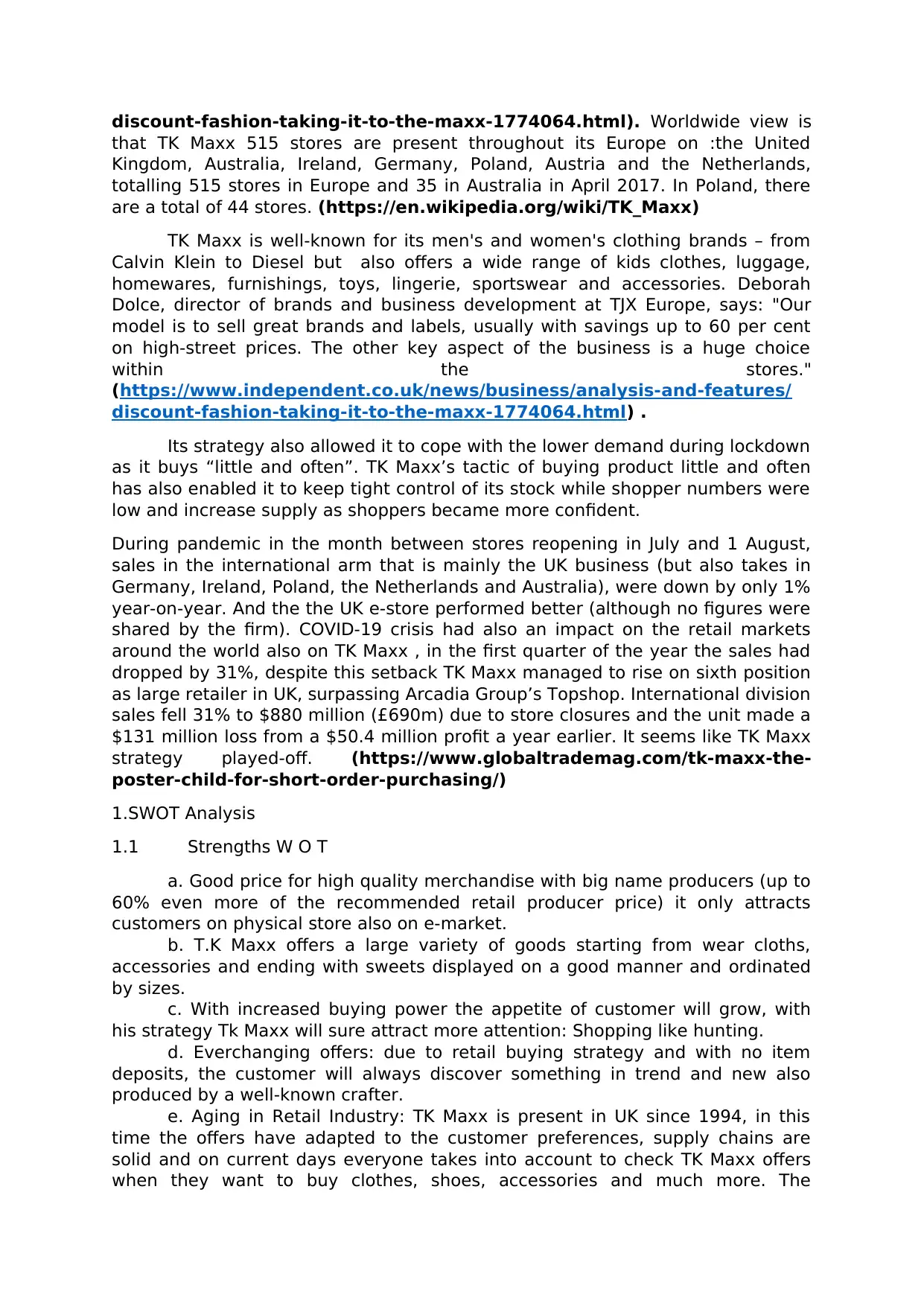
discount-fashion-taking-it-to-the-maxx-1774064.html). Worldwide view is
that TK Maxx 515 stores are present throughout its Europe on :the United
Kingdom, Australia, Ireland, Germany, Poland, Austria and the Netherlands,
totalling 515 stores in Europe and 35 in Australia in April 2017. In Poland, there
are a total of 44 stores. (https://en.wikipedia.org/wiki/TK_Maxx)
TK Maxx is well-known for its men's and women's clothing brands – from
Calvin Klein to Diesel but also offers a wide range of kids clothes, luggage,
homewares, furnishings, toys, lingerie, sportswear and accessories. Deborah
Dolce, director of brands and business development at TJX Europe, says: "Our
model is to sell great brands and labels, usually with savings up to 60 per cent
on high-street prices. The other key aspect of the business is a huge choice
within the stores."
(https://www.independent.co.uk/news/business/analysis-and-features/
discount-fashion-taking-it-to-the-maxx-1774064.html) .
Its strategy also allowed it to cope with the lower demand during lockdown
as it buys “little and often”. TK Maxx’s tactic of buying product little and often
has also enabled it to keep tight control of its stock while shopper numbers were
low and increase supply as shoppers became more confident.
During pandemic in the month between stores reopening in July and 1 August,
sales in the international arm that is mainly the UK business (but also takes in
Germany, Ireland, Poland, the Netherlands and Australia), were down by only 1%
year-on-year. And the the UK e-store performed better (although no figures were
shared by the firm). COVID-19 crisis had also an impact on the retail markets
around the world also on TK Maxx , in the first quarter of the year the sales had
dropped by 31%, despite this setback TK Maxx managed to rise on sixth position
as large retailer in UK, surpassing Arcadia Group’s Topshop. International division
sales fell 31% to $880 million (£690m) due to store closures and the unit made a
$131 million loss from a $50.4 million profit a year earlier. It seems like TK Maxx
strategy played-off. (https://www.globaltrademag.com/tk-maxx-the-
poster-child-for-short-order-purchasing/)
1.SWOT Analysis
1.1 Strengths W O T
a. Good price for high quality merchandise with big name producers (up to
60% even more of the recommended retail producer price) it only attracts
customers on physical store also on e-market.
b. T.K Maxx offers a large variety of goods starting from wear cloths,
accessories and ending with sweets displayed on a good manner and ordinated
by sizes.
c. With increased buying power the appetite of customer will grow, with
his strategy Tk Maxx will sure attract more attention: Shopping like hunting.
d. Everchanging offers: due to retail buying strategy and with no item
deposits, the customer will always discover something in trend and new also
produced by a well-known crafter.
e. Aging in Retail Industry: TK Maxx is present in UK since 1994, in this
time the offers have adapted to the customer preferences, supply chains are
solid and on current days everyone takes into account to check TK Maxx offers
when they want to buy clothes, shoes, accessories and much more. The
that TK Maxx 515 stores are present throughout its Europe on :the United
Kingdom, Australia, Ireland, Germany, Poland, Austria and the Netherlands,
totalling 515 stores in Europe and 35 in Australia in April 2017. In Poland, there
are a total of 44 stores. (https://en.wikipedia.org/wiki/TK_Maxx)
TK Maxx is well-known for its men's and women's clothing brands – from
Calvin Klein to Diesel but also offers a wide range of kids clothes, luggage,
homewares, furnishings, toys, lingerie, sportswear and accessories. Deborah
Dolce, director of brands and business development at TJX Europe, says: "Our
model is to sell great brands and labels, usually with savings up to 60 per cent
on high-street prices. The other key aspect of the business is a huge choice
within the stores."
(https://www.independent.co.uk/news/business/analysis-and-features/
discount-fashion-taking-it-to-the-maxx-1774064.html) .
Its strategy also allowed it to cope with the lower demand during lockdown
as it buys “little and often”. TK Maxx’s tactic of buying product little and often
has also enabled it to keep tight control of its stock while shopper numbers were
low and increase supply as shoppers became more confident.
During pandemic in the month between stores reopening in July and 1 August,
sales in the international arm that is mainly the UK business (but also takes in
Germany, Ireland, Poland, the Netherlands and Australia), were down by only 1%
year-on-year. And the the UK e-store performed better (although no figures were
shared by the firm). COVID-19 crisis had also an impact on the retail markets
around the world also on TK Maxx , in the first quarter of the year the sales had
dropped by 31%, despite this setback TK Maxx managed to rise on sixth position
as large retailer in UK, surpassing Arcadia Group’s Topshop. International division
sales fell 31% to $880 million (£690m) due to store closures and the unit made a
$131 million loss from a $50.4 million profit a year earlier. It seems like TK Maxx
strategy played-off. (https://www.globaltrademag.com/tk-maxx-the-
poster-child-for-short-order-purchasing/)
1.SWOT Analysis
1.1 Strengths W O T
a. Good price for high quality merchandise with big name producers (up to
60% even more of the recommended retail producer price) it only attracts
customers on physical store also on e-market.
b. T.K Maxx offers a large variety of goods starting from wear cloths,
accessories and ending with sweets displayed on a good manner and ordinated
by sizes.
c. With increased buying power the appetite of customer will grow, with
his strategy Tk Maxx will sure attract more attention: Shopping like hunting.
d. Everchanging offers: due to retail buying strategy and with no item
deposits, the customer will always discover something in trend and new also
produced by a well-known crafter.
e. Aging in Retail Industry: TK Maxx is present in UK since 1994, in this
time the offers have adapted to the customer preferences, supply chains are
solid and on current days everyone takes into account to check TK Maxx offers
when they want to buy clothes, shoes, accessories and much more. The
Paraphrase This Document
Need a fresh take? Get an instant paraphrase of this document with our AI Paraphraser
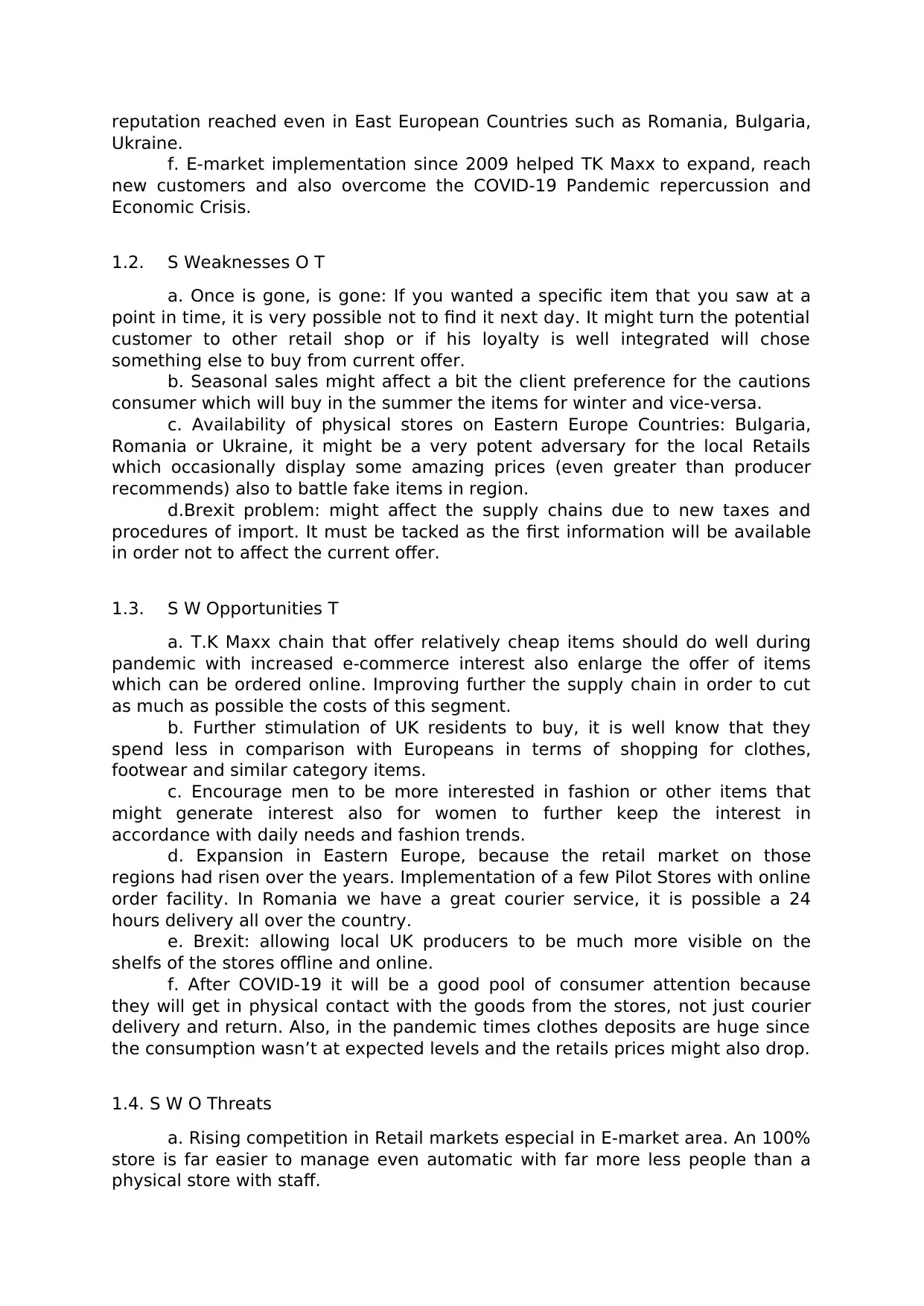
reputation reached even in East European Countries such as Romania, Bulgaria,
Ukraine.
f. E-market implementation since 2009 helped TK Maxx to expand, reach
new customers and also overcome the COVID-19 Pandemic repercussion and
Economic Crisis.
1.2. S Weaknesses O T
a. Once is gone, is gone: If you wanted a specific item that you saw at a
point in time, it is very possible not to find it next day. It might turn the potential
customer to other retail shop or if his loyalty is well integrated will chose
something else to buy from current offer.
b. Seasonal sales might affect a bit the client preference for the cautions
consumer which will buy in the summer the items for winter and vice-versa.
c. Availability of physical stores on Eastern Europe Countries: Bulgaria,
Romania or Ukraine, it might be a very potent adversary for the local Retails
which occasionally display some amazing prices (even greater than producer
recommends) also to battle fake items in region.
d.Brexit problem: might affect the supply chains due to new taxes and
procedures of import. It must be tacked as the first information will be available
in order not to affect the current offer.
1.3. S W Opportunities T
a. T.K Maxx chain that offer relatively cheap items should do well during
pandemic with increased e-commerce interest also enlarge the offer of items
which can be ordered online. Improving further the supply chain in order to cut
as much as possible the costs of this segment.
b. Further stimulation of UK residents to buy, it is well know that they
spend less in comparison with Europeans in terms of shopping for clothes,
footwear and similar category items.
c. Encourage men to be more interested in fashion or other items that
might generate interest also for women to further keep the interest in
accordance with daily needs and fashion trends.
d. Expansion in Eastern Europe, because the retail market on those
regions had risen over the years. Implementation of a few Pilot Stores with online
order facility. In Romania we have a great courier service, it is possible a 24
hours delivery all over the country.
e. Brexit: allowing local UK producers to be much more visible on the
shelfs of the stores offline and online.
f. After COVID-19 it will be a good pool of consumer attention because
they will get in physical contact with the goods from the stores, not just courier
delivery and return. Also, in the pandemic times clothes deposits are huge since
the consumption wasn’t at expected levels and the retails prices might also drop.
1.4. S W O Threats
a. Rising competition in Retail markets especial in E-market area. An 100%
store is far easier to manage even automatic with far more less people than a
physical store with staff.
Ukraine.
f. E-market implementation since 2009 helped TK Maxx to expand, reach
new customers and also overcome the COVID-19 Pandemic repercussion and
Economic Crisis.
1.2. S Weaknesses O T
a. Once is gone, is gone: If you wanted a specific item that you saw at a
point in time, it is very possible not to find it next day. It might turn the potential
customer to other retail shop or if his loyalty is well integrated will chose
something else to buy from current offer.
b. Seasonal sales might affect a bit the client preference for the cautions
consumer which will buy in the summer the items for winter and vice-versa.
c. Availability of physical stores on Eastern Europe Countries: Bulgaria,
Romania or Ukraine, it might be a very potent adversary for the local Retails
which occasionally display some amazing prices (even greater than producer
recommends) also to battle fake items in region.
d.Brexit problem: might affect the supply chains due to new taxes and
procedures of import. It must be tacked as the first information will be available
in order not to affect the current offer.
1.3. S W Opportunities T
a. T.K Maxx chain that offer relatively cheap items should do well during
pandemic with increased e-commerce interest also enlarge the offer of items
which can be ordered online. Improving further the supply chain in order to cut
as much as possible the costs of this segment.
b. Further stimulation of UK residents to buy, it is well know that they
spend less in comparison with Europeans in terms of shopping for clothes,
footwear and similar category items.
c. Encourage men to be more interested in fashion or other items that
might generate interest also for women to further keep the interest in
accordance with daily needs and fashion trends.
d. Expansion in Eastern Europe, because the retail market on those
regions had risen over the years. Implementation of a few Pilot Stores with online
order facility. In Romania we have a great courier service, it is possible a 24
hours delivery all over the country.
e. Brexit: allowing local UK producers to be much more visible on the
shelfs of the stores offline and online.
f. After COVID-19 it will be a good pool of consumer attention because
they will get in physical contact with the goods from the stores, not just courier
delivery and return. Also, in the pandemic times clothes deposits are huge since
the consumption wasn’t at expected levels and the retails prices might also drop.
1.4. S W O Threats
a. Rising competition in Retail markets especial in E-market area. An 100%
store is far easier to manage even automatic with far more less people than a
physical store with staff.
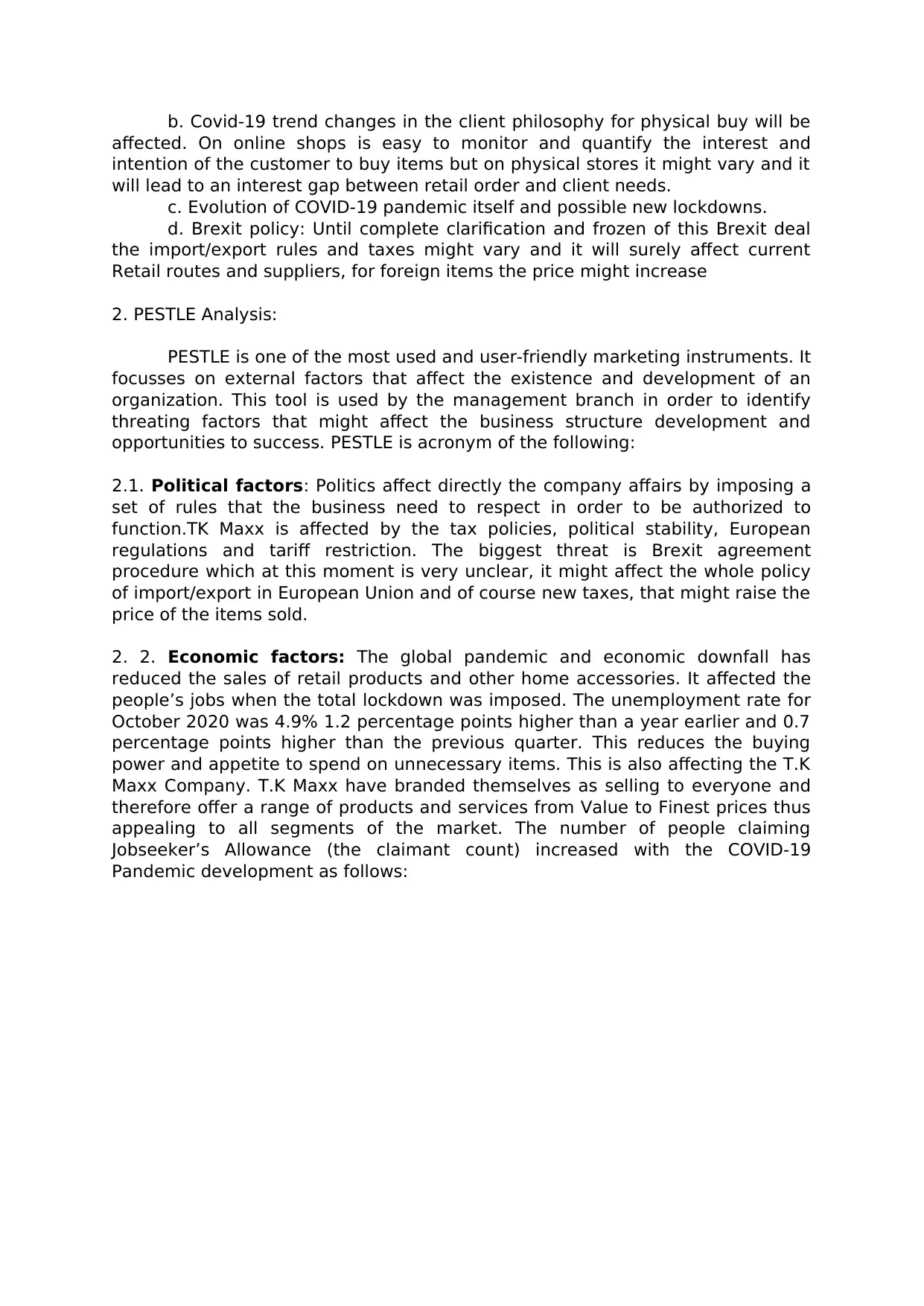
b. Covid-19 trend changes in the client philosophy for physical buy will be
affected. On online shops is easy to monitor and quantify the interest and
intention of the customer to buy items but on physical stores it might vary and it
will lead to an interest gap between retail order and client needs.
c. Evolution of COVID-19 pandemic itself and possible new lockdowns.
d. Brexit policy: Until complete clarification and frozen of this Brexit deal
the import/export rules and taxes might vary and it will surely affect current
Retail routes and suppliers, for foreign items the price might increase
2. PESTLE Analysis:
PESTLE is one of the most used and user-friendly marketing instruments. It
focusses on external factors that affect the existence and development of an
organization. This tool is used by the management branch in order to identify
threating factors that might affect the business structure development and
opportunities to success. PESTLE is acronym of the following:
2.1. Political factors: Politics affect directly the company affairs by imposing a
set of rules that the business need to respect in order to be authorized to
function.TK Maxx is affected by the tax policies, political stability, European
regulations and tariff restriction. The biggest threat is Brexit agreement
procedure which at this moment is very unclear, it might affect the whole policy
of import/export in European Union and of course new taxes, that might raise the
price of the items sold.
2. 2. Economic factors: The global pandemic and economic downfall has
reduced the sales of retail products and other home accessories. It affected the
people’s jobs when the total lockdown was imposed. The unemployment rate for
October 2020 was 4.9% 1.2 percentage points higher than a year earlier and 0.7
percentage points higher than the previous quarter. This reduces the buying
power and appetite to spend on unnecessary items. This is also affecting the T.K
Maxx Company. T.K Maxx have branded themselves as selling to everyone and
therefore offer a range of products and services from Value to Finest prices thus
appealing to all segments of the market. The number of people claiming
Jobseeker’s Allowance (the claimant count) increased with the COVID-19
Pandemic development as follows:
affected. On online shops is easy to monitor and quantify the interest and
intention of the customer to buy items but on physical stores it might vary and it
will lead to an interest gap between retail order and client needs.
c. Evolution of COVID-19 pandemic itself and possible new lockdowns.
d. Brexit policy: Until complete clarification and frozen of this Brexit deal
the import/export rules and taxes might vary and it will surely affect current
Retail routes and suppliers, for foreign items the price might increase
2. PESTLE Analysis:
PESTLE is one of the most used and user-friendly marketing instruments. It
focusses on external factors that affect the existence and development of an
organization. This tool is used by the management branch in order to identify
threating factors that might affect the business structure development and
opportunities to success. PESTLE is acronym of the following:
2.1. Political factors: Politics affect directly the company affairs by imposing a
set of rules that the business need to respect in order to be authorized to
function.TK Maxx is affected by the tax policies, political stability, European
regulations and tariff restriction. The biggest threat is Brexit agreement
procedure which at this moment is very unclear, it might affect the whole policy
of import/export in European Union and of course new taxes, that might raise the
price of the items sold.
2. 2. Economic factors: The global pandemic and economic downfall has
reduced the sales of retail products and other home accessories. It affected the
people’s jobs when the total lockdown was imposed. The unemployment rate for
October 2020 was 4.9% 1.2 percentage points higher than a year earlier and 0.7
percentage points higher than the previous quarter. This reduces the buying
power and appetite to spend on unnecessary items. This is also affecting the T.K
Maxx Company. T.K Maxx have branded themselves as selling to everyone and
therefore offer a range of products and services from Value to Finest prices thus
appealing to all segments of the market. The number of people claiming
Jobseeker’s Allowance (the claimant count) increased with the COVID-19
Pandemic development as follows:
⊘ This is a preview!⊘
Do you want full access?
Subscribe today to unlock all pages.

Trusted by 1+ million students worldwide
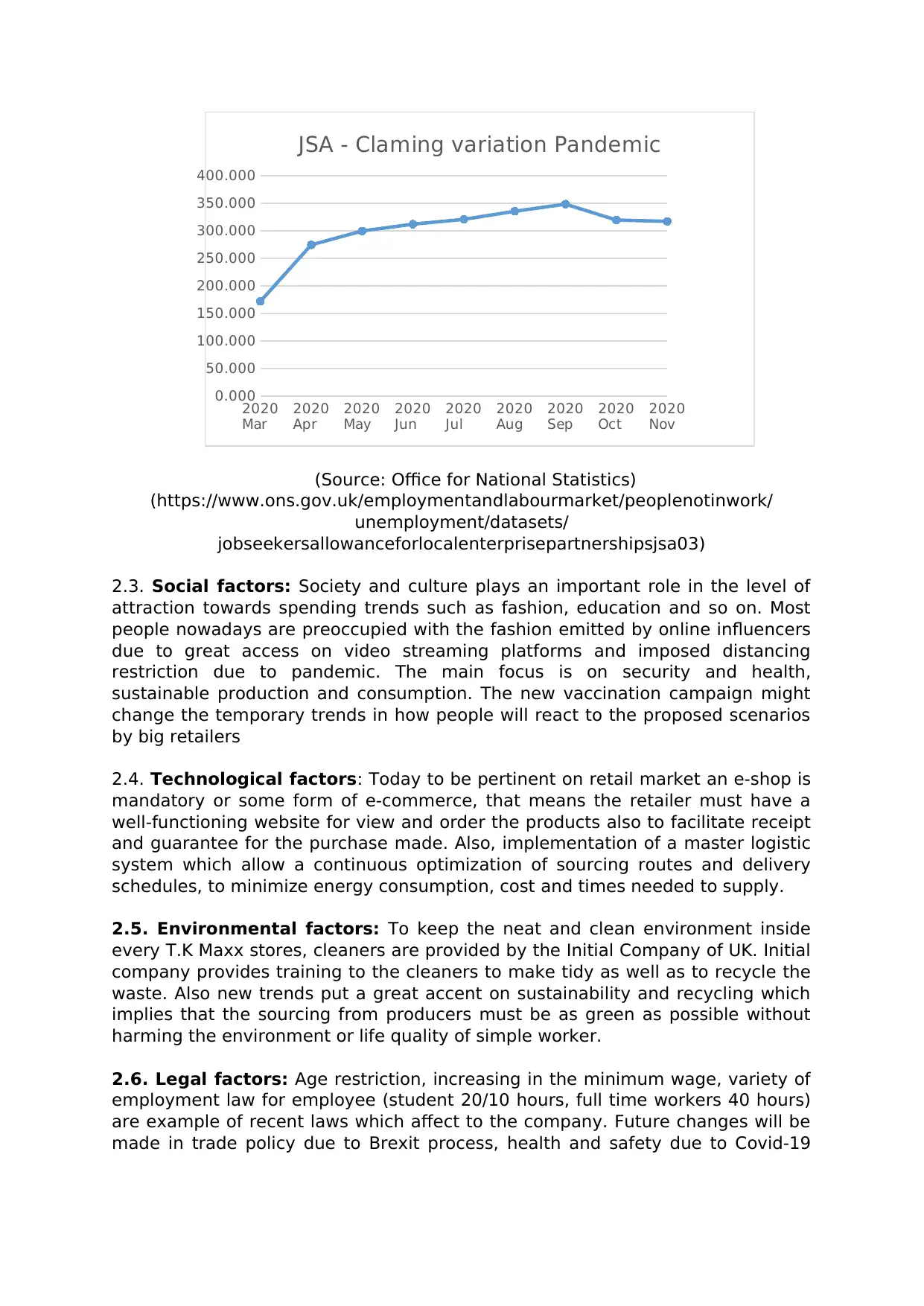
2020
Mar
2020
Apr
2020
May
2020
Jun
2020
Jul
2020
Aug
2020
Sep
2020
Oct
2020
Nov
0.000
50.000
100.000
150.000
200.000
250.000
300.000
350.000
400.000
JSA - Claming variation Pandemic
(Source: Office for National Statistics)
(https://www.ons.gov.uk/employmentandlabourmarket/peoplenotinwork/
unemployment/datasets/
jobseekersallowanceforlocalenterprisepartnershipsjsa03)
2.3. Social factors: Society and culture plays an important role in the level of
attraction towards spending trends such as fashion, education and so on. Most
people nowadays are preoccupied with the fashion emitted by online influencers
due to great access on video streaming platforms and imposed distancing
restriction due to pandemic. The main focus is on security and health,
sustainable production and consumption. The new vaccination campaign might
change the temporary trends in how people will react to the proposed scenarios
by big retailers
2.4. Technological factors: Today to be pertinent on retail market an e-shop is
mandatory or some form of e-commerce, that means the retailer must have a
well-functioning website for view and order the products also to facilitate receipt
and guarantee for the purchase made. Also, implementation of a master logistic
system which allow a continuous optimization of sourcing routes and delivery
schedules, to minimize energy consumption, cost and times needed to supply.
2.5. Environmental factors: To keep the neat and clean environment inside
every T.K Maxx stores, cleaners are provided by the Initial Company of UK. Initial
company provides training to the cleaners to make tidy as well as to recycle the
waste. Also new trends put a great accent on sustainability and recycling which
implies that the sourcing from producers must be as green as possible without
harming the environment or life quality of simple worker.
2.6. Legal factors: Age restriction, increasing in the minimum wage, variety of
employment law for employee (student 20/10 hours, full time workers 40 hours)
are example of recent laws which affect to the company. Future changes will be
made in trade policy due to Brexit process, health and safety due to Covid-19
Mar
2020
Apr
2020
May
2020
Jun
2020
Jul
2020
Aug
2020
Sep
2020
Oct
2020
Nov
0.000
50.000
100.000
150.000
200.000
250.000
300.000
350.000
400.000
JSA - Claming variation Pandemic
(Source: Office for National Statistics)
(https://www.ons.gov.uk/employmentandlabourmarket/peoplenotinwork/
unemployment/datasets/
jobseekersallowanceforlocalenterprisepartnershipsjsa03)
2.3. Social factors: Society and culture plays an important role in the level of
attraction towards spending trends such as fashion, education and so on. Most
people nowadays are preoccupied with the fashion emitted by online influencers
due to great access on video streaming platforms and imposed distancing
restriction due to pandemic. The main focus is on security and health,
sustainable production and consumption. The new vaccination campaign might
change the temporary trends in how people will react to the proposed scenarios
by big retailers
2.4. Technological factors: Today to be pertinent on retail market an e-shop is
mandatory or some form of e-commerce, that means the retailer must have a
well-functioning website for view and order the products also to facilitate receipt
and guarantee for the purchase made. Also, implementation of a master logistic
system which allow a continuous optimization of sourcing routes and delivery
schedules, to minimize energy consumption, cost and times needed to supply.
2.5. Environmental factors: To keep the neat and clean environment inside
every T.K Maxx stores, cleaners are provided by the Initial Company of UK. Initial
company provides training to the cleaners to make tidy as well as to recycle the
waste. Also new trends put a great accent on sustainability and recycling which
implies that the sourcing from producers must be as green as possible without
harming the environment or life quality of simple worker.
2.6. Legal factors: Age restriction, increasing in the minimum wage, variety of
employment law for employee (student 20/10 hours, full time workers 40 hours)
are example of recent laws which affect to the company. Future changes will be
made in trade policy due to Brexit process, health and safety due to Covid-19
Paraphrase This Document
Need a fresh take? Get an instant paraphrase of this document with our AI Paraphraser
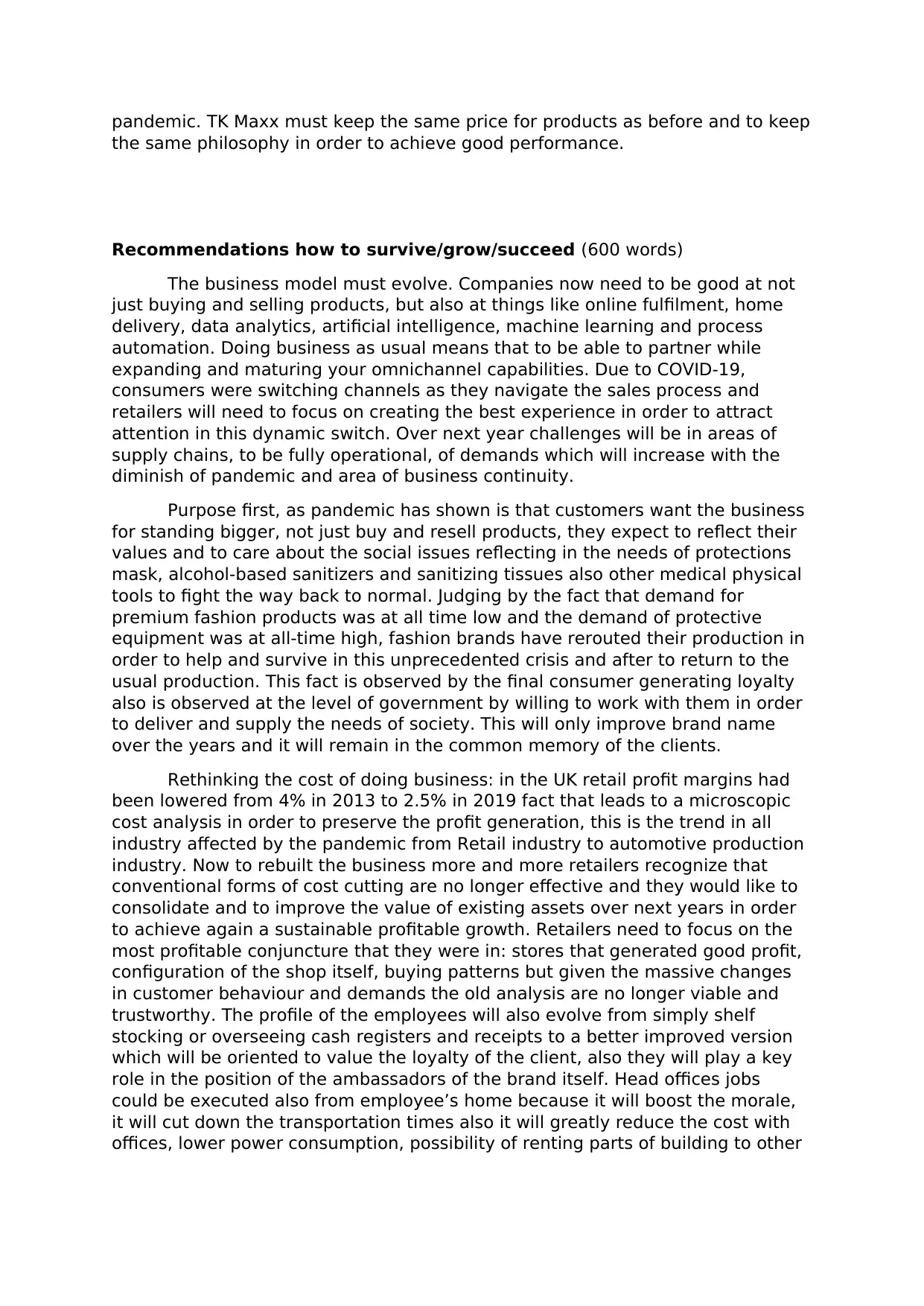
pandemic. TK Maxx must keep the same price for products as before and to keep
the same philosophy in order to achieve good performance.
Recommendations how to survive/grow/succeed (600 words)
The business model must evolve. Companies now need to be good at not
just buying and selling products, but also at things like online fulfilment, home
delivery, data analytics, artificial intelligence, machine learning and process
automation. Doing business as usual means that to be able to partner while
expanding and maturing your omnichannel capabilities. Due to COVID-19,
consumers were switching channels as they navigate the sales process and
retailers will need to focus on creating the best experience in order to attract
attention in this dynamic switch. Over next year challenges will be in areas of
supply chains, to be fully operational, of demands which will increase with the
diminish of pandemic and area of business continuity.
Purpose first, as pandemic has shown is that customers want the business
for standing bigger, not just buy and resell products, they expect to reflect their
values and to care about the social issues reflecting in the needs of protections
mask, alcohol-based sanitizers and sanitizing tissues also other medical physical
tools to fight the way back to normal. Judging by the fact that demand for
premium fashion products was at all time low and the demand of protective
equipment was at all-time high, fashion brands have rerouted their production in
order to help and survive in this unprecedented crisis and after to return to the
usual production. This fact is observed by the final consumer generating loyalty
also is observed at the level of government by willing to work with them in order
to deliver and supply the needs of society. This will only improve brand name
over the years and it will remain in the common memory of the clients.
Rethinking the cost of doing business: in the UK retail profit margins had
been lowered from 4% in 2013 to 2.5% in 2019 fact that leads to a microscopic
cost analysis in order to preserve the profit generation, this is the trend in all
industry affected by the pandemic from Retail industry to automotive production
industry. Now to rebuilt the business more and more retailers recognize that
conventional forms of cost cutting are no longer effective and they would like to
consolidate and to improve the value of existing assets over next years in order
to achieve again a sustainable profitable growth. Retailers need to focus on the
most profitable conjuncture that they were in: stores that generated good profit,
configuration of the shop itself, buying patterns but given the massive changes
in customer behaviour and demands the old analysis are no longer viable and
trustworthy. The profile of the employees will also evolve from simply shelf
stocking or overseeing cash registers and receipts to a better improved version
which will be oriented to value the loyalty of the client, also they will play a key
role in the position of the ambassadors of the brand itself. Head offices jobs
could be executed also from employee’s home because it will boost the morale,
it will cut down the transportation times also it will greatly reduce the cost with
offices, lower power consumption, possibility of renting parts of building to other
the same philosophy in order to achieve good performance.
Recommendations how to survive/grow/succeed (600 words)
The business model must evolve. Companies now need to be good at not
just buying and selling products, but also at things like online fulfilment, home
delivery, data analytics, artificial intelligence, machine learning and process
automation. Doing business as usual means that to be able to partner while
expanding and maturing your omnichannel capabilities. Due to COVID-19,
consumers were switching channels as they navigate the sales process and
retailers will need to focus on creating the best experience in order to attract
attention in this dynamic switch. Over next year challenges will be in areas of
supply chains, to be fully operational, of demands which will increase with the
diminish of pandemic and area of business continuity.
Purpose first, as pandemic has shown is that customers want the business
for standing bigger, not just buy and resell products, they expect to reflect their
values and to care about the social issues reflecting in the needs of protections
mask, alcohol-based sanitizers and sanitizing tissues also other medical physical
tools to fight the way back to normal. Judging by the fact that demand for
premium fashion products was at all time low and the demand of protective
equipment was at all-time high, fashion brands have rerouted their production in
order to help and survive in this unprecedented crisis and after to return to the
usual production. This fact is observed by the final consumer generating loyalty
also is observed at the level of government by willing to work with them in order
to deliver and supply the needs of society. This will only improve brand name
over the years and it will remain in the common memory of the clients.
Rethinking the cost of doing business: in the UK retail profit margins had
been lowered from 4% in 2013 to 2.5% in 2019 fact that leads to a microscopic
cost analysis in order to preserve the profit generation, this is the trend in all
industry affected by the pandemic from Retail industry to automotive production
industry. Now to rebuilt the business more and more retailers recognize that
conventional forms of cost cutting are no longer effective and they would like to
consolidate and to improve the value of existing assets over next years in order
to achieve again a sustainable profitable growth. Retailers need to focus on the
most profitable conjuncture that they were in: stores that generated good profit,
configuration of the shop itself, buying patterns but given the massive changes
in customer behaviour and demands the old analysis are no longer viable and
trustworthy. The profile of the employees will also evolve from simply shelf
stocking or overseeing cash registers and receipts to a better improved version
which will be oriented to value the loyalty of the client, also they will play a key
role in the position of the ambassadors of the brand itself. Head offices jobs
could be executed also from employee’s home because it will boost the morale,
it will cut down the transportation times also it will greatly reduce the cost with
offices, lower power consumption, possibility of renting parts of building to other
1 out of 8
Related Documents
Your All-in-One AI-Powered Toolkit for Academic Success.
+13062052269
info@desklib.com
Available 24*7 on WhatsApp / Email
![[object Object]](/_next/static/media/star-bottom.7253800d.svg)
Unlock your academic potential
Copyright © 2020–2026 A2Z Services. All Rights Reserved. Developed and managed by ZUCOL.




